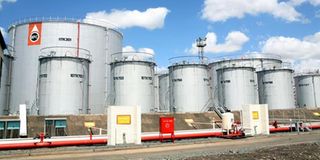Reprieve for KPC in Sh2.4bn product distribution row with Rubis

Oil storage tanks at the Kenya Pipeline Company in Nairobi. KPC is in dispute with Rubis over a breach of contract.
A multibillion-shilling dispute between State-owned Kenya Pipeline Company (KPC) and KenolKobil arising from a breach of contract is set to escalate to the court of appeal after a judge allowed the State Corporation to file an appeal.
Appellate judge Grace Ngenye-Macharia has granted KPC 30 days to file the appeal, pointing to another round of litigation of a dispute that emanated from an agreement signed in 1999 between the State Corporation and Kenya oil company limited, which now trades as Rubis Energy Kenya PLC.
The judge also struck out a request by KPC to temporarily stop Rubis from enforcing an arbitration award of $19,758,594 (Sh2.4 billion) over a breach of an agreement pending the hearing and determination of the intended appeal.
Justice Macharia-Ngenye said that prayer was not for consideration by a single judge.
In the agreement dated May 10, 1999, KPC agreed to provide transportation of the oil marketer’s petroleum products through its systems and deliver it to specified points.
The genesis of the court dispute is the decision of an arbitrator, Mr Ahmednasir Abdullahi, a lawyer to award the Kenya oil company limited and Kobil Petroleum Limited a net sum of $37, 909,879 (Sh4,655,333,141) and a further Sh1,866,494,783 totaling to Sh6.5 billion after KPC allegedly breached the agreement.
The arbitrator’s award, delivered on December 10, 2009, comprised damages for loss of consumer goodwill, cost of public relations, marketing campaign, and loss of financial goodwill.
In the alleged breach, the oil marketer had accused KPC of failing to facilitate the berthing of various ships carrying its petroleum products worth Sh9 billion by failing to allocate its storage space.
The arbitrator faulted the KPC for allowing the fallen Triton Petroleum Company to use its facilities to store oil products and in the process reduce the ullage available in the industry.
KPC was aggrieved by the arbitrator’s decision and challenged the same to the High Court which set aside the award and referred the matter back to the arbitrator for determination.
The companies were in turn dissatisfied with the High Court ruling and filed an appeal to the Court of Appeal. The appeal was dismissed.
As a result, the arbitrator reassessed the matter, and in an award dated May 26, 2016, he awarded the two companies a sum of $19,758,594 (Sh2,426,355,343).
KPC again felt uncomfortable with that decision and stated that the arbitrator did not assess strict conformity with the High Court and Court of Appeal’s directions.
It returned to the High Court with a second appeal seeking a reversal of the reassessment. Through a judgment delivered on August 18, 2022, Justice Wilfridah Okwany ruled that the High Court lacked the authority to deal with the matter on the ground that the reassessment orders emanated from the Court of Appeal.
Justice Okwany said since the matter had been litigated at the Court of Appeal, the appellate judges were better placed to determine whether the arbitrator complied with the direction issued to him.
Since the final order that led to the reassessment of loss and damages by the arbitrator emanated from the Court of Appeal, Justice Okwany said the High Court could not interrogate the said decision to establish whether the reassessment was done in compliance with the appellate court’s directive.





